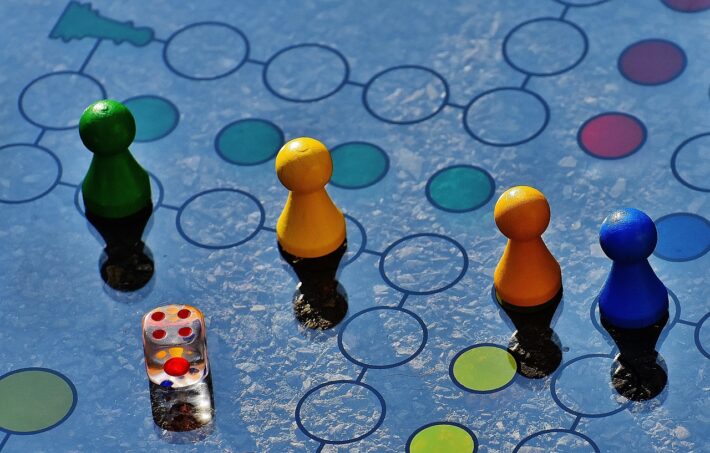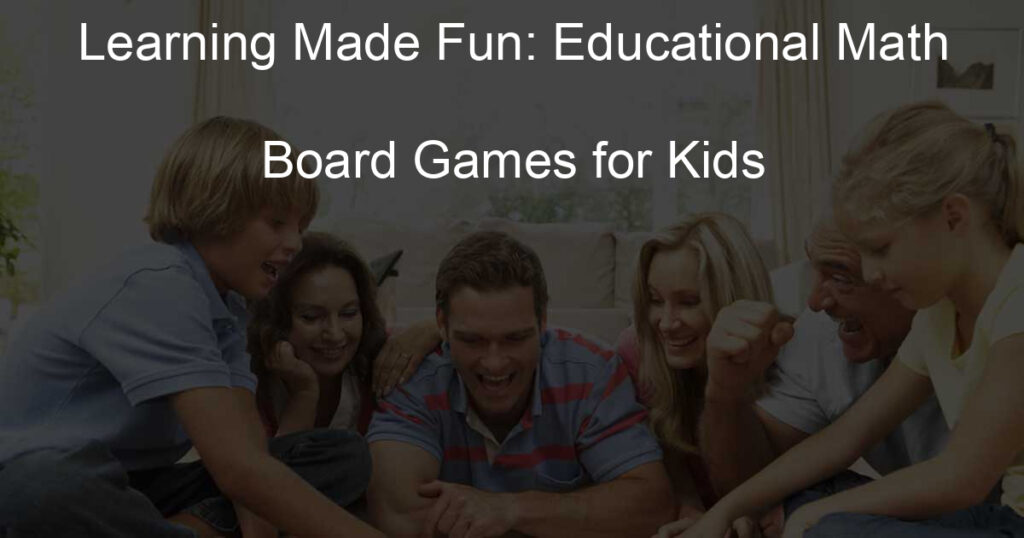Mathematics, a subject often met with groans and sighs, doesn’t have to be dull and daunting. Learning math can be an enjoyable experience filled with excitement and discovery. One way to make math engaging is through the use of educational math board games that not only entertain kids but also provide valuable opportunities for learning and skill development.
In the course of this discussion, we will explore the world of math board games and discover how they can benefit children’s learning. Get ready to embark on a fun-filled journey where numbers come to life and learning becomes an adventure!
How can math board games benefit children’s learning?
Math board games are a fantastic tool for engaging children in the world of numbers. They offer a wide range of benefits that go beyond mere entertainment. Firstly, these games make learning math fun and enjoyable, which helps create a positive attitude towards the subject.
When kids are having fun, they become more motivated to learn and explore. Math board games also promote active learning, as children actively participate in the gameplay, making decisions, and solving problems. This hands-on approach enhances their understanding of mathematical concepts and improves retention.
| Math Board Game | Target Age Range | Key Learning Objectives |
|---|---|---|
| Math Adventures | 4-6 years | Counting, Number Recognition, Addition, Subtraction |
| Shape Quest | 6-8 years | Geometry, Spatial Reasoning, Pattern Recognition |
| Fraction Frenzy | 8-10 years | Fractions, Decimals, Equivalent Ratios |
| Number Ninjas | 7-9 years | Number Operations, Problem-Solving, Strategy |
| Math Detectives | 9-12 years | Critical Thinking, Logical Reasoning, Algebraic Concepts |
What are the top math board games for improving basic arithmetic skills?
-
Math Dash: Addition and Subtraction – This exciting game challenges kids to solve equations and build their addition and subtraction skills in a race against time. With its fast-paced gameplay and colorful design, it keeps children engaged while strengthening their arithmetic abilities.
-
Number Ninjas – In this game, players become math ninjas on a mission to defeat evil math monsters. By solving math problems involving addition, subtraction, multiplication, and division, kids develop a strong foundation in basic arithmetic skills while enjoying an action-packed adventure.
Which math board games promote problem-solving and critical thinking?

-
Math Detective – This detective-themed game invites children to solve math mysteries by applying their problem-solving skills. Through puzzles, riddles, and logic challenges, kids enhance their critical thinking abilities and learn to approach math problems with a detective’s mindset.
-
Math Quest – In this epic journey, players embark on a quest to save the land from an evil sorcerer by solving math problems. By encountering obstacles and using their problem-solving skills, children develop their critical thinking abilities while experiencing an immersive and exciting adventure.
Are there any math board games that encourage strategic thinking and planning?
Math board games can also nurture strategic thinking and planning skills in children. One notable game in this category is “Mathopoly.” Inspired by the classic board game, “Monopoly,” Mathopoly incorporates math problems into gameplay.
Players strategize to acquire properties and solve math challenges along the way. This game not only strengthens mathematical skills but also encourages strategic thinking, decision-making, and long-term planning.
How can math board games help children develop spatial reasoning skills?
Spatial reasoning, the ability to mentally manipulate shapes and understand spatial relationships, is essential in math and everyday life. Math board games can foster this skill by providing opportunities for spatial exploration and problem-solving. “Shape Shifter” is a captivating game that challenges children to rearrange geometric shapes to match given patterns. By engaging in this spatial puzzle, kids develop their spatial reasoning skills and gain a deeper understanding of shape concepts.
What are the best math board games for teaching fractions and decimals?
Understanding fractions and decimals can be challenging for young learners, but math board games can make the process much more accessible and enjoyable. One such game is “Fraction Frenzy.” By dividing and distributing pizza slices, kids learn about fractions in a deliciously entertaining way.
Another fantastic option is “Decimal Dash,” where players race to collect decimal cards and practice converting decimals to fractions. These games turn abstract concepts into tangible experiences, making fractions and decimals easier to grasp.
Are there any math board games that focus on geometry and shapes?
Geometry and shape recognition are vital components of mathematical understanding. “GeoQuest” is an interactive game that takes players on a global adventure to explore and identify different geometric shapes in real-world contexts. With its captivating visuals and engaging gameplay, children develop their geometric knowledge while having a blast.
Which math board games can enhance children’s number recognition abilities?

Math board games can play a crucial role in enhancing children’s number recognition abilities. Games like “Number Safari” provide an engaging and stimulating environment for kids to practice identifying and comparing numbers. By searching for hidden animals and matching them to the correct numbers, children not only improve their number recognition skills but also develop a strong numerical foundation.
These interactive games make learning numbers enjoyable and help children become more confident in their ability to recognize and work with numbers. Through the exciting gameplay and interactive nature of math board games, children can strengthen their number recognition skills while having fun along the way.
How do math board games foster collaboration and teamwork among kids?
Math board games offer excellent opportunities for children to collaborate and work as a team, fostering essential social and interpersonal skills. Games like “Math Puzzlers” encourage cooperative problem-solving as players work together to solve math puzzles and unlock hidden treasures. Through collaboration, kids learn to communicate effectively, share ideas, and appreciate the value of teamwork.
Are there any math board games that incorporate storytelling and imagination?
Storytelling and imagination can bring math concepts to life and make them more relatable and engaging. “Math Adventures” is a captivating game that combines storytelling with math problem-solving.
Players embark on thrilling adventures, overcome challenges, and solve math problems to progress in the story. This integration of storytelling and math sparks imagination and creativity, making learning an exciting journey.
What are the most engaging math board games for memorizing multiplication tables?
Memorizing multiplication tables can be a daunting task, but it doesn’t have to be boring. Math board games like “Times Table Trek” transform this process into an exciting quest.
By solving multiplication problems and advancing through different levels, children reinforce their multiplication skills while enjoying a thrilling adventure. The game’s immersive nature makes memorization more enjoyable and memorable.
Which math board games are suitable for different age groups?

Math board games cater to various age groups, ensuring that children of all ages can find a game suitable for their learning needs. For younger learners, games like “Counting Castle” focus on basic counting and number recognition.
Older children can benefit from games such as “Math Maze,” which challenges them with more complex math problems. It’s important to choose games that align with the child’s developmental stage and provide an appropriate level of challenge.
Can math board games be used as a supplemental learning tool in classrooms?
Math board games are not only great for home use but can also be valuable supplemental learning tools in classrooms. They provide hands-on learning experiences, engage students actively, and create an enjoyable and interactive learning environment. Incorporating math board games into classroom activities can make math lessons more exciting and help reinforce concepts taught in the curriculum.
How can parents integrate math board games into their children’s daily routines?
Parents can seamlessly integrate math board games into their children’s daily routines, making learning math a natural and enjoyable part of their lives. Setting aside regular game nights or incorporating math games into family activities allows children to have fun while reinforcing their mathematical skills. Parents can also encourage kids to play math board games with their siblings or friends, promoting social interaction and cooperative learning.
What are the key factors to consider when choosing math board games for kids?
-
Age Appropriateness: Select games that align with the child’s age and developmental stage to ensure an optimal learning experience.
-
Educational Value: Look for games that have a clear educational focus and align with the child’s learning goals. Consider games that reinforce specific math skills or concepts.
-
Engaging Gameplay: Choose visually appealing games, that have exciting gameplay, and capture the child’s interest. A captivating game will motivate the child to play and learn.
-
Multiplayer Options: Opt for games that allow multiple players to foster collaboration, competition, and social interaction.
-
Reviews and Recommendations: Read reviews and seek recommendations from educators, parents, and reputable sources to find highly regarded math board games.
-
Quality and Durability: Consider the quality and durability of the game components to ensure longevity and repeated use.
Final Thoughts
Math board games offer a fun and effective way to make learning math an enjoyable experience for kids. These games provide numerous benefits, including improved arithmetic skills, problem-solving abilities, critical thinking, and spatial reasoning. They promote strategic thinking, foster collaboration, and integrate storytelling and imagination into math learning.
From fractions and decimals to geometry and number recognition, math board games cover a wide range of topics and cater to different age groups. Whether used at home or in classrooms, math board games serve as valuable supplemental learning tools. By incorporating math board games into children’s daily routines, parents can create a positive attitude towards math and help their children develop essential math skills while having a blast.



